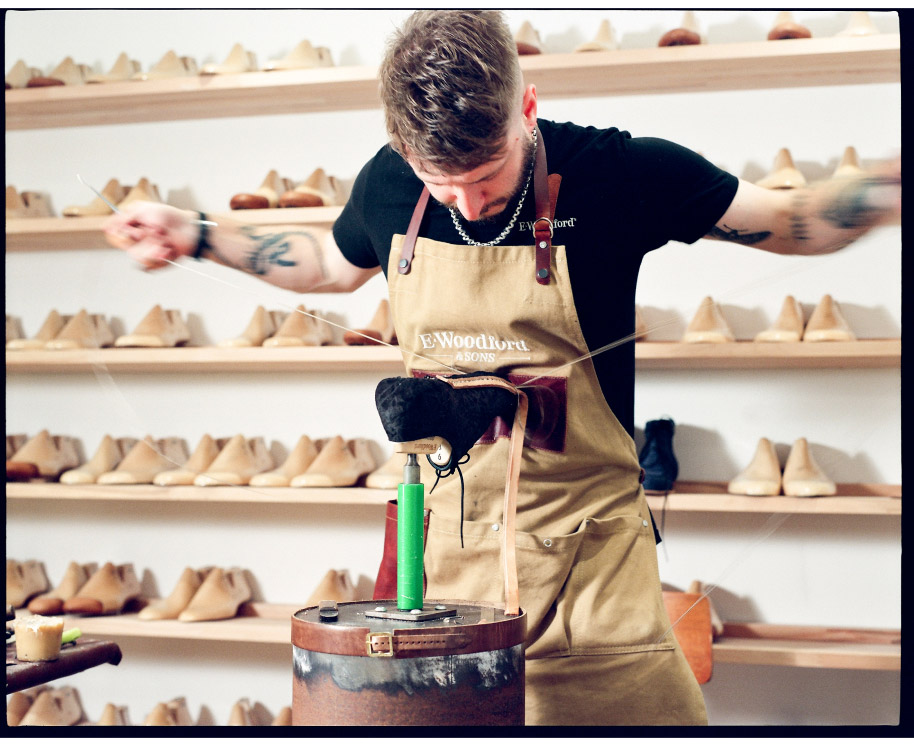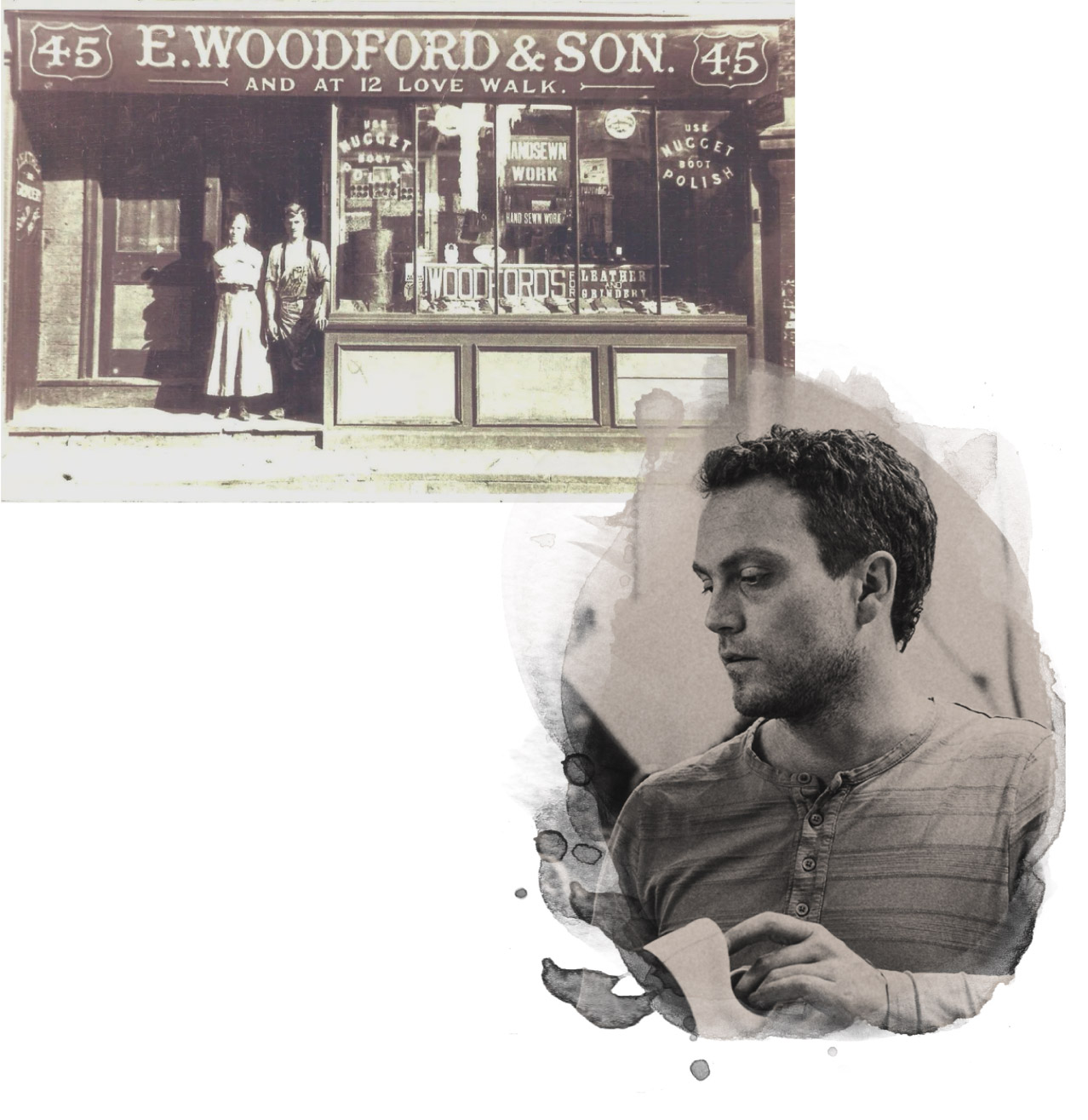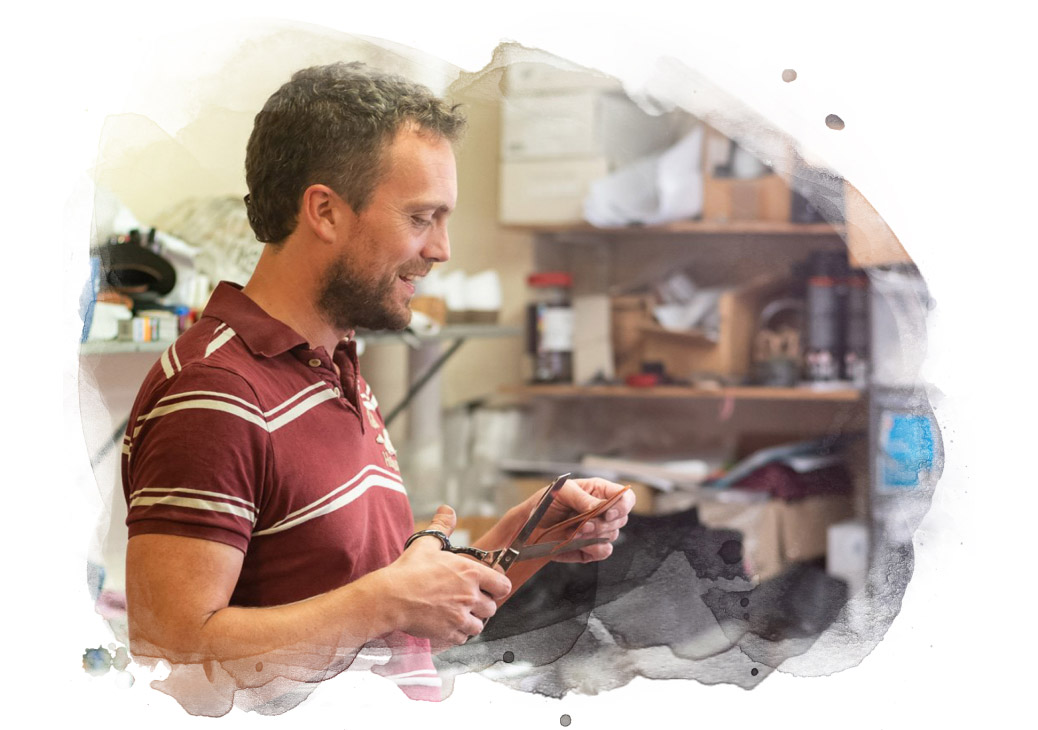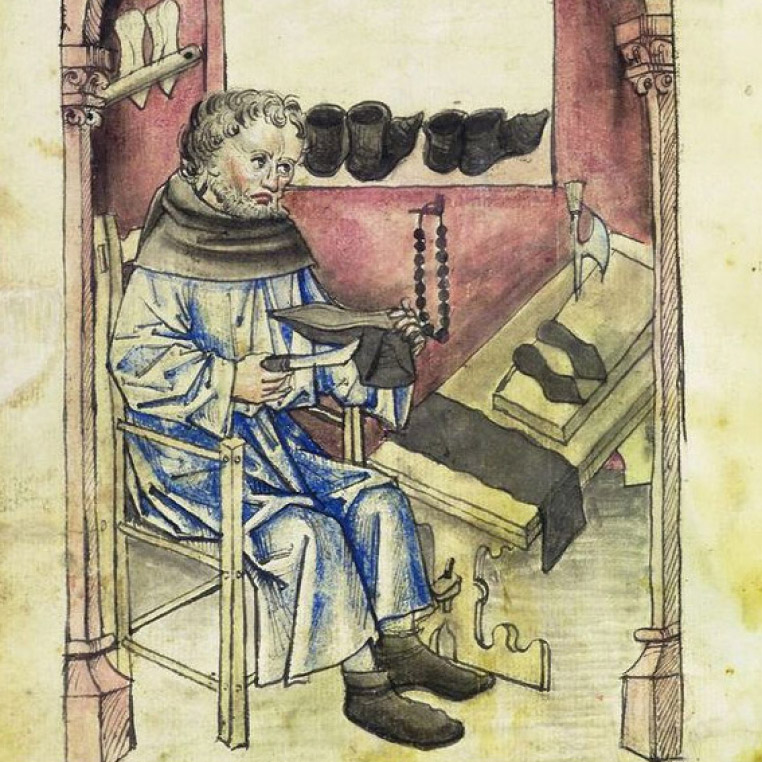
Northampton has had a shoe industry from as long ago as the 12th century.
While we can’t trace the Woodford connections that far back, our ancestors were definitely running shoe businesses in Victorian London.
1860
In 1860, Edwin Woodford was born in Stockwell. We don’t know much about his childhood, but as an adult he moved to South Africa and married Susan, later returning home with his new bride.


The Industrial Revolution of the 18th and 19th centuries had long left its mark on the UK by this point and most workers were employed in factories, rather than being home-based. Hand-made items were no longer the norm and were now often a signifier of wealth.
While terrible poverty continued to plague the less fortunate, improvements in housing and living standards were beginning to be seen across England.
1908
Edwin settled back into London life against this backdrop, starting a family and setting up shop as a wheelwright (a builder and fixer of wooden wheels) and cobbler (mender of shoes), later, when fully trained, opening E.Woodford & Son, Bespoke Maker and Repairer of Footwear at 45 Coldharbour Lane, in 1908.

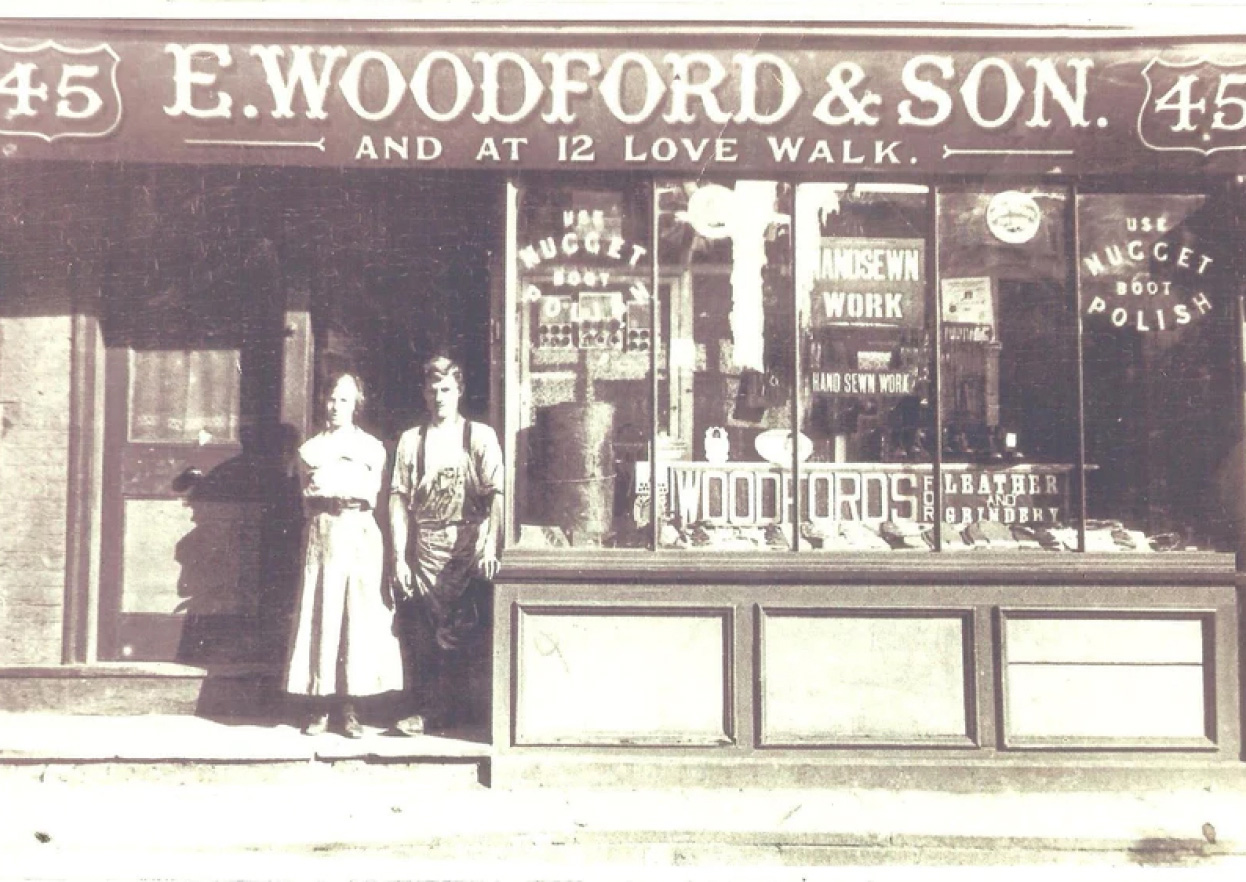
The son referred to in the shop’s name was Ernest, then 20 years old, who joined his father in the business, with a second shop soon opening nearby at 12 Love Walk.

1914
In the summer of 1914 the First World War broke out, with Britain’s involvement officially starting on August 4th. Ernest joined up to fight but was injured early on and sent home where he resumed his work as the bombs rained down.
Soldiers and their families were originally told they’d be reunited for Christmas, that the war would be over within months. Whether or not the government genuinely believed that, they were gravely mistaken – the fighting and bloodshed raged on for four years with more than 21 million lives lost and countless others permanently scarred, both mentally and physically, by the time it was declared over in November, 1918.
1919
The following year, as the world began picking up the pieces of what was left, Ernest’s son Stanley was born.
Growing up in war-torn London, he soon followed in the family footsteps and entered the shoe trade.
He would run through the streets of 1920s London at eight-years-old delivering shoes directly to customers’ doors and later go on to work in the two shops.

1935
In 1935, Edwin, the man who began it all died, aged 75.
1939
Just a few years after that, conflict once again loomed over Europe. When Hitler invaded Poland in 1939, the Second World War broke out.
It was a time of great upheaval and anxiety for all. The business, now run by Ernest, who was preparing to hand over to his son, struggled as leather became increasingly difficult to source. Most of it was being sent to Northampton to make army boots. When Stanley was conscripted to go and fight the decision was taken to suspend business at E Woodford & Sons.

Just 20 years old, Stanley was sent to Dunkirk, France, where during a six-week battle French and British troops were surrounded by German soldiers in what Prime Minister Winston Churchill later referred to as a ‘colossal military disaster.’
1945
After going on to fight in Algiers, Stanley returned home in 1945. He spent many years suffering health complications as a result of his experiences.
His war diary, complete with hand-drawn maps and cartoons, sits in the Crown and E.Woodford showroom today, a reminder of the sacrifices made by people of the past for the present.

1946
As Stanley convalesced and began rebuilding his life, another Woodford man joined the family: his son Andrew.
He was born in 1946, three years before his grandad Ernest passed away.
1971
After completing school in London, Andrew studied business and engineering on a work-study apprenticeship.
Fast forward to 1971: glam rock was dominating the UK fashion and music scene. T-Rex’s Marc Bolan appeared on television screens wearing glitter, satin and platform boots. Adding a few extra centimetres to your height became as simple as buying a new pair of shoes.
It was also the year that Andrew Woodford – son of war veteran Stanley and father of Chris – moved to Northampton, the world-famous centre of British shoe-making. He’d made the move in order to run a workforce producing various footwear brands.
Without having really planned it, Andrew, now 25, found himself compelled by fate into the shoe industry, just like three generations of his family before him.

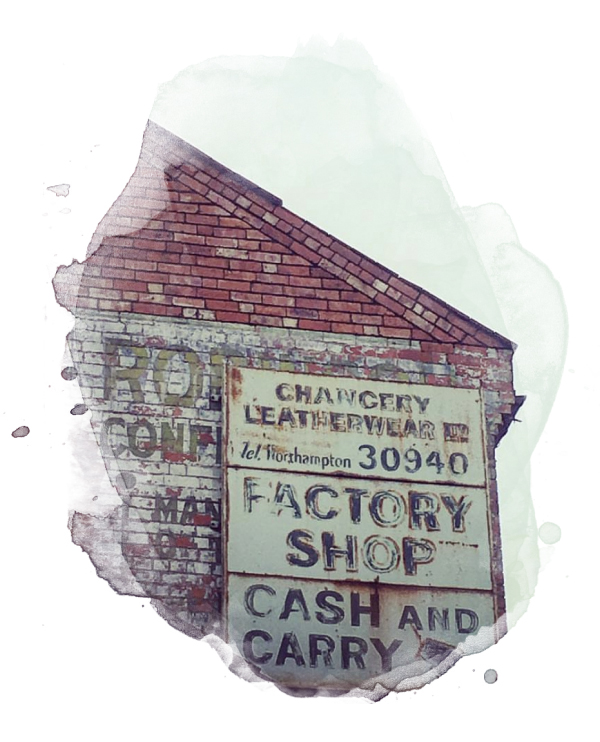
1972
Before long, Andrew created Chancery Leatherwear, producing moccasins for department stores up and down the country, at its peak employing 200 staff and making 100,000 pairs a year with a turnover of around £5million – no small sum in 1970s Britain.
1978
As hippies became has-beens, Britain’s youth were caught in the grip of punk rock and in 1978, against a background of social turmoil and national strikes, Andrew’s son Chris was born.
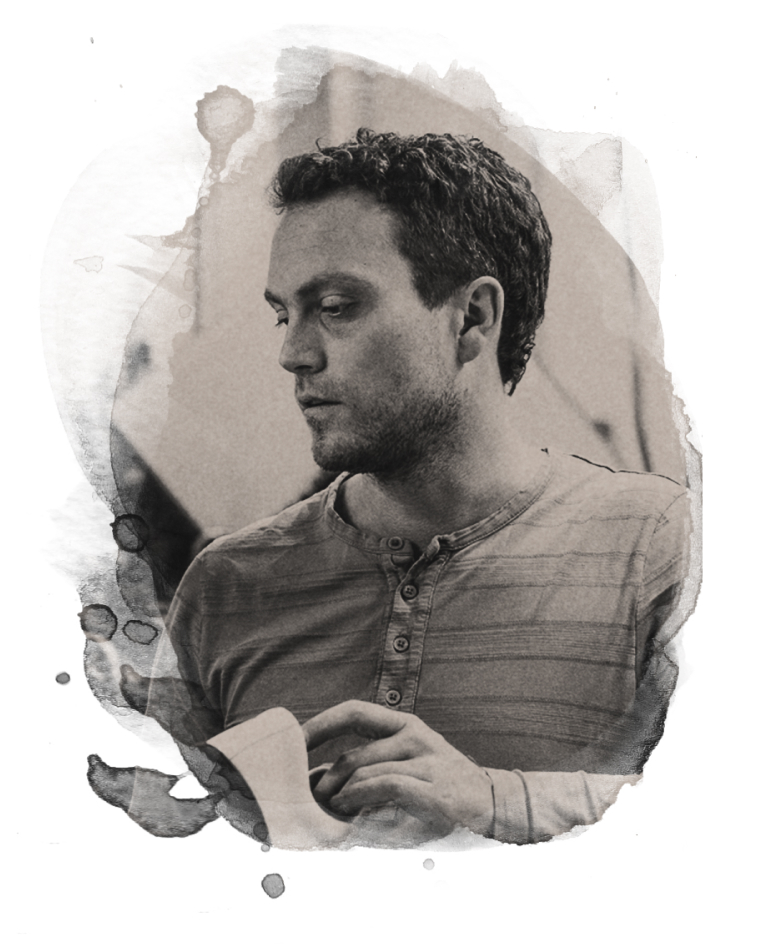

His first memories are of the buzzing of machines and the smell of leather in his father’s factory of the early 1980s; a busy and productive place of work. But shoe making – and British manufacturing as a whole – was going through tough times.
The business, like so many others of that time, eventually fell victim to the latest move to mass production, this time abroad. With goods being made on a greater scale, prices dropped and smaller operations were often unable to compete.
1984
It was in 1984 or 1985 – when patent leather heels and espadrilles were common choices for feet – that Andrew closed down Chancery Leatherwear, his former wholesale customers preferring to buy in bulk from Asia. It was a stressful time and the family home was almost lost as the business closed.
Fortunately, learning from his past and spotting a gap in the market, Andrew created a new opportunity, less reliant on mass production: niche footwear for sports and leisure activities. He rebuilt as Chancery Footwear, making specialist shoes for other labels
1990
By the 1990s, Northampton, for so long synonymous with quality shoes, had seen much of its industry decimated, with old factories repurposed for housing or left abandoned to fall into disrepair.
Yet a few decades on, a number of heritage brands retain a presence in the town and newer businesses committed to traditional shoemaking have been established

1995
In 1995, Chris began as an apprentice for Chancery Shoes, earning £40 a week, combining work and study.
Despite growing up immersed in the industry Chris took his time to understand the whole business of footwear, from sourcing materials to end product and the entire process in-between.
Looking for more sustainable and viable avenues of business, Chris realised pattern cutting and design were two essential skills: if he could master those, he need never be reliant on outsourcing manufacturing and at the whims of middlemen and factory agents.
He attended college in Wellingborough where he honed his art under the tutelage of many local experts, including Len Robinson.
Some of his most valuable education came from visiting pattern-cutters who’d been in the industry for decades, and often their parents and grandparents before them, too.
Many worked from home, self-employed and paid according to each piece they produced. These industry veterans shared the skills and tricks-of-the-trade they’d picked up from older generations, contributing to Chris’ expansive knowledge of shoemaking.
2000s
For the first ten years Chris designed and made shoes for Chancery, which now focused on making sports footwear for a number of disciplines. Simultaneously, Chris was honing his skills and finding opportunities for crafting a wider range of shoe constructions.
Requests for bespoke footwear came in, leading to more high-end work for fashion brands and Saville Row was soon asking for his handmade shoes.
Driven by creativity and the excitement of seeing his designs brought to life, Chris was inspired by the possibilities he envisaged for the future of the industry, supported by the traditional skills of the past.
2005
In the mid-2000s Chris began designing his own range.
The first steady customers were a Japanese distribution company, as the Japanese market is well renown for appreciating well-made British footwear: made in Northampton, sold in Tokyo.
He spent time in East Asia, getting to know its market and consumers, and was asked by a department store in Japan to design a sneaker for them.
This led to ideas about sneaker designs for the Western market – and crucially, business models that used a simpler manufacturing and distribution process.
2016
In 2016, Crown Northampton was born.
Crown’s direct-to-consumer approach was the result. It was far less vulnerable to issues with supply and demand as it only made what had already been ordered.
Fewer businesses taking a cut on the way meant customer costs could be kept relatively low and staff employment was less volatile. As Chris puts it:

“We don’t need to cover wholesalers’ percentages and all the other added costs that come with selling through distributors. That money saved means we can use the best materials and techniques at every stage of shoemaking and we can justify why our footwear is priced as it is.”
2019
In fewer than eight years, the brand has achieved world renown for quality, comfort and minimalist style.
It’s doubled the size of its factory and staff numbers in five years – adding a welcome boost to the town’s shoe trade and reputation.
Crown’s success inspired Chris to take this made-to-order model even further, with ambitions to make fairly priced, highest quality boots and shoes possible and the idea for E.Woodford & Sons taking root in 2019.
2020
By the following year, Chris’s former college teacher, Len, had been employed to train staff in the same skills and specialisms he passed on to Chris all those years ago.
With his rich family history threaded through the business, the importance of keeping the skillsets of the past alive through traditional methods of pattern-cutting, stitching, lasting and welting, all by hand, forms and drives the company ethos, as well as further plans for expansion.
The newer brand is based on a similar business model, with an online-only presence and all footwear made-to-order.
As with Crown, this allows it to offer high-end footwear to individual specifications at fair prices, and selling online means we can make connections with skilled workers from around the world.

2023
E.Woodford combines the best practices of viable, modern business with the skills and tradition of artisan boot and shoe making.
Many of our staff have been shoemakers for decades and have generational links to the trade.
Their experience and connection to that history is helping to bring E.Woodford & Sons full-circle.
Returning the business to its former glory and expanding its customer base worldwide while showcasing the time-honoured skills and heritage that make Northampton and the Woodford family so special.
...and beyond
Coming soon… E.Woodford Shoe Academy is being established to train up the next generation and provide employment and career opportunities to people in Northampton.
